

-
UNDER THE AUSPICES OF H.E. THE PRESIDENT OF THE HELLENIC REPUBLIC MR. CONSTANTINE AN. TASSOULAS
-

UNDER THE AUSPICES OF HIS ALL HOLINESS ECUMENICAL PATRIARCH BARTHOLOMEW
«NISYROS DIALOGUES»® 2025
July 3-6, 2025 Nisyros Island
"The Eastern Mediterranean in the Vortex of Geopolitical Changes"
Geopolitical Developments - European Defense - Energy Security - Insularity - Interculturality
Opportunities & Challenges
Greece - Cyprus - Egypt - Israel - Eastern Mediterranean
Under the auspices of H.E. the President of the Hellenic Republic Mr. Constantine An. Tassoulas
&
Under the auspices of His Holiness Ecumenical Patriarch Bartholomew
Agenda



Confirmed Speakers
«Nisyros Dialogues 2025»

Marios
Dafnomilis
Foresight Advisor, Special Secretariat of Foresight, Presidency of the Hellenic Government, Bertelsmann Foundation Fellow

Angela
Gerekou
Greek National Tourism Organization (GNTO)
f. Deputy Minister of Culture & Tourism

Constantinos
Filis

Dr. Fay
Makantasi
Research Director of DiaNEOsis

Yannis
Maniatis
Member of the European Parliament PASOK – KINAL
Professor
f. Minister of Environment, Energy and Climate Change

Konstantinos
Mathioudakis
Professor, National Technical University of Athens,
fmr Secretary General for Energy & Mineral Resources Ministry of Environment and Energy

Thomas J.
Miller
US Ambassador to Bosnia and Herzegovina 1999–2001
Ambassador for Cyprus Negotiations 1997–99

Maria
Papadopoulou
Professor NTUA
Board Chair N.E.C.C.A.

Yiannis
Papamikrouleas
Head of Trading Dept DEPA COMMERCIAL

Dimitris
Papastergiou

Dimitris
Paraskevopoulos
frm Secretary General of the Ministry of Foreign Affairs

Alexandra
Sdoukou
Press Representative of Nea Demokratia

Christos
Zerefos
Climate Envoy for Greece

Klea
Sougioultzoglou
Cultural Advisor
Art Historian and Author of Ancient and Contemporary Art Publications
Dialogue Moderators

Athanasios (Tom)
Ellis

Sia
Kosioni

Manolis
Kostidis

Fanis
Papathanasiou

Maria
Sarafoglou

Alexia
Tasouli

Pavlos
Tsimas
Αuspices
-
UNDER THE AUSPICES OF H.E. THE PRESIDENT OF THE HELLENIC REPUBLIC MR. CONSTANTINE AN. TASSOULAS
-

UNDER THE AUSPICES OF HIS ALL HOLINESS ECUMENICAL PATRIARCH BARTHOLOMEW
Content Partners






«Nisyros Dialogues 2025» Theme
Dear friends of the Georgios M. Mihalos Foundation and the «Nisyros Dialogues»®,
We are pleased to announce the theme of this year's 4th «Nisyros Dialogues 2025»:
"The Eastern Mediterranean in the Vortex of Geopolitical Changes"
Γεωπολιτικές Geopolitical Developments - European Defense - Energy Security - Insularity - Interculturality
Opportunities & Challenges
Greece - Cyprus - Egypt - Israel - Eastern Mediterranean
Under the auspices of H.E. the President of the Hellenic Republic Mr. Constantine An. Tassoulas
&
Under the auspices of His Holiness Ecumenical Patriarch Bartholomew
Official Communication Sponsors:
> The Kathimerini
> The New York Times International Edition - Kathimerini English Edition
> SKAI TV & Radio
> ANA-MPA News Agency
The countdown to our summer rendezvous on Nisyros island has begun! From July 3 to 6, 2025, the 4th «Nisyros Dialogues» will take place in the unique and imposing setting on the rim of the "Stefanos" crater in the Nisyros volcano.
At a time of rapid social transformations, wars, political upheavals and cultural-religious conflicts reshaping the geopolitical map of power and interests, the «Nisyros Dialogues» are more relevant than ever.
The axes of this year's «Nisyros Dialogues 2025» are:
- Geopolitics of Eastern Mediterranean
- Energy Security & Conflicts - Climate Crisis & Resilience
- Insularity, Digital Transformation, and the New Economy
- Interculturality of the Eastern Mediterranean
- Artificial Intelligence, Space Economy & Geo-Cybersecurity
The «Dialogues» do not limit themselves to merely recording and identifying problems, they go further: detecting risks and pinpointing opportunities. Action plans and strategies will be discussed in the following areas:
- Geopolitics of the Eastern Mediterranean with a focus on Energy
- Energy Security & Conflicts
- European Defense & Defense Industry
- Space, Artificial Intelligence & Geo-Cybersecurity
- New Natural Resources, Emerging Equilibriums, and Shifting Power Dynamics
- Interculturality of the Eastern Mediterranean
- Insularity and Remote Mountainous Regions – Challenges and Solutions
- Tourism
- Climate Crisis & Resilience
Ultimately, this year's 4th «Nisyros Dialogues», seek to “read” and decode the new geopolitical map as it is being shaped—whether through conflicts of interest, increasing social and societal needs and demands, or the influence of regional powers.
The Questions:
- Are natural resources inexhaustible? And by what phenomena - political or climatic - are they threatened?
- Are financial instruments sufficient, or are they proving inadequate?
- Does culture unite or divide societies?
- Where is Artificial Intelligence leading us? Benefits and Risks.
- Are islands emerging from isolation or are they entering a new cycle of dependency?
- Is the timing and effective response/management of climate change a mere wishful thinking? To what extent would related actions by the international community provoke significant negative reactions in human societies?
- The Resilience of Infrastructures & Societies as a New Challenge.
- Is energy a bridge to security, or a pathway to conflict?
- What are the priorities among the leaderships of the West and East, Europe and America?
- Which are the emerging powers and which giants are weakening?
Participants
The «Nisyros Dialogues» which are under the permanent Αuspices of His All Holiness Ecumenical Patriarch Bartholomew and annually under the Αuspices of the Presidency of the Hellenic Republic, bring together representatives of Governments, the Political World and Civil Society, Diplomats, Academics, Technocrats, Business Leaders, high-ranking Executives, from Greece and abroad and experienced journalists with longstanding careers in Greek and international media.
The countdown for the 4th «Nisyros Dialogues 2025» has begun! We will keep you regularly updated on themes, participants, and everything else related to this year's gathering at the "Stefanos" crater in the Nisyros volcano.

Sponsors
MEGA SPONSOR















Media Sponsors
Official Air Carrier Sponsor

Official Sponsor of Transportation Needs

Official Travel Agency

Dialogue Briefs
-
Interculturality of the Eastern Mediterranean
-
Artificial Intelligence, European Defense, Geo-Cybersecurity, Conflicts & Space Economy
-
New Wealth-Producing Energy Sources - New Balances of Power
Review

The «Nisyros Dialogues 2025» ® placed Nisyros at the epicenter of the geopolitical dialogue on the Eastern Mediterranean
With the participation of 29 distinguished speakers from all over the political spectrum, diplomatic, academic and business worlds, the «Nisyros Dialogues 2025» ® was successfully concluded on Sunday, July 6. Leading ministers, MPs, diplomats, academics and journalists were in Nisyros discussing all the current issues of the Eastern Mediterranean and formulating proposals for action.
Among them, the Deputy Prime Minister Kostis Hatzidakis, the President of PASOK and President of the main opposition Nikos Androulakis, the Minister of Energy of Cyprus George Papanastasiou, the Minister of Energy of Greece Stavros Papastavrou, the Member of the European Parliament and Vice-President of the European Socialists and Democrats, Yannis Maniatis, the Minister of Digital Governance Dimitris Papastergiou, the Deputy Minister of Maritime Affairs, Stefanos Gκikas. Also noteworthy were the participation of the Greek-American businessman John Catsimatidis, who joined online from New York, the participation of the Member of State and former Chief of the Hellenic National Defence Forces, Evangelos Apostolakis, as well as the speech of the President of the Greek National Tourism Organization, Angela Gerekou.
The «Dialogues» were coordinated by the experienced journalists Sia Kosioni, Athanasios Ellis, Fanis Papathanasiou, Alexia Tasouli, Maria Sarafoglou and Manolis Kostidis. While with the support of Kathimerini, SKAI, the English edition of Kathimerini, the Athens-Macedonian News Agency and Kerkyra Publications, as communication sponsors, the «Nisyros Dialogues 2025» received extensive coverage by transferring the developments from Nisyros to the whole of Greece.
For 3 days, the akritic island of Nisyros became the focal point for shaping the developments in the Eastern Mediterranean, hosting, as one of the prominent journalists who participated in the «Dialogues», pointed out: "an unexpected group of politicians, academics, journalists and other debaters, who crossed opinions and, in some cases, strongly opposed, but did not stop discussing in search of possible pathways".
And he characteristically posed the question himself—offering his own answer:
"Nisyros Dialogues: Can grand strategies emerge from small initiatives?
Is it meaningful to host a forum on the geopolitics of our time, on the major international political power balances and the corresponding economic challenges, on a small remote island of the Dodecanese — even if it is impressive, with an active volcano and a unique geophysical identity — it is still just over 40 square kilometers in size, with around 900 inhabitants, located only 9 nautical miles from Turkey’s Datça Peninsula? This year’s «Nisyros Dialogues», now in their fourth consecutive edition, gathered an unexpected array of political, academic, journalistic, and other high-level participants gave an affirmative answer to what may seem like a simplistic question.
The entire two-day event of the «Nisyros Dialogues» 2025 gave us this promising possibility—especially with emerging follow-up editions in Brussels and possibly Doha—that indeed, grand strategies can arise from small initiatives."
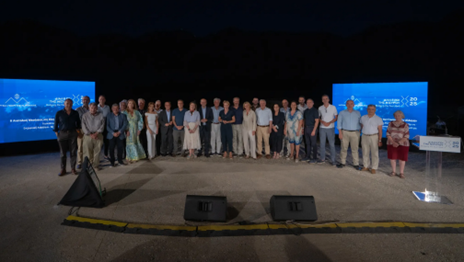
Day 1 - July 4, 2025
Dynamic start
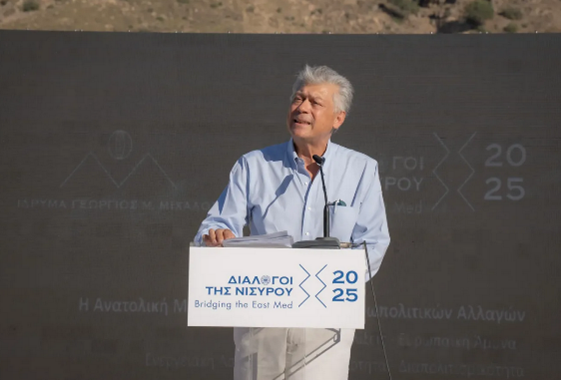
The day began with a speech by the President of the “Georgios M. Mihalos Foundation”, organizer of the «Nisyros Dialogues»®, Mr. Panagiotis G. Mihalos.
Mr. Mihalos opened the proceedings of the «Dialogues» with a touching reference to their establishment as an important geopolitical event.
He emphasized that the «Nisyros Dialogues» have established an identity that transcends the boundaries of a typical forum. They create and have evolved into an "informal, yet high-level diplomatic space" where the critical geopolitical issues of the Eastern Mediterranean are openly discussed and solutions are promoted.
Mr. Mihalos expressed the Foundation's pride in highlighting through dialogue -rather than confinct- the importance of insularity and the need for sustainable development in border areas. The choice of the Eastern Mediterranean as the focal point of the dialogue is proving more timely than ever, at a time of geopolitical instability, increased military tensions and the urgent climate crisis.
"The «Nisyros Dialogues» have established an identity that goes beyond the limits of a formal forum. Instead, they have evolved into an informal, yet high-level diplomatic space".
The Patriarch's Message: Appeal for Peace and Justice
The greetings and blessings of Ecumenical Patriarch Bartholomew were conveyed by the representative of the Patriarchate.

He underlined the Patriarchate's position on the importance of dialogue to address the major problems facing humanity today, mentioning in particular the destruction of the natural environment, climate change, social injustices and wars in Ukraine and the Middle East, which could potentially lead to global conflict.
The call for peace, especially between religions, is a prerequisite for international peace, since, as it has been characteristically said, "Peace between religions is a prerequisite for international peace, and war in the name of religion is war against religion."
Insularity in the Spotlight: Guardians of European Values
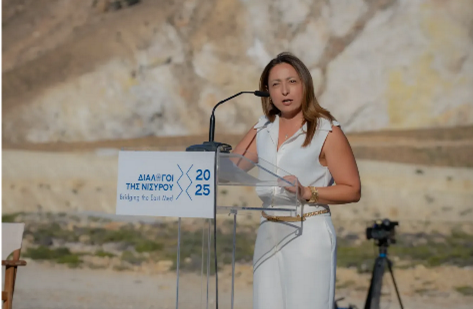
Ms. Konstantina Svynou, Regional Governor of Kos and Nisyros, emphasized the crucial role of the Greek islands. She described the islands as "a geographic and political frontline", but also as "guardians of peace, stability and democratic values of Europe". Ms. Svynou underlined the urgent need to strengthen European defense as a pillar of autonomy and the necessity of integrating the region into the EU energy plan. She also reiterated the firm position that "insularity as a complex reality and as an institutional category must be placed at the center of Greek and European policy." Following on, the Mayor of Nisyros, Mr. Koroneos, continued on a similar direction, focusing on the importance of Nisyros as a "vanguard" in the Eastern Mediterranean and a "natural laboratory of resilience".
Critical Discussions: Foreign Policy, Energy and Economy
The first day also hosted a lively exchange of views between the government and the main opposition.
Mr. Nikos Androulakis, President of PASOK-KINAL and Leader of the Main Opposition, harshly criticized the government's foreign policy, arguing that it is "going from defeat to defeat". He expressed concern about the inaction of Greek diplomacy in relation to developments in Syria and Libya, as well as the participation of Turkish private defense companies in European defense programs. He stressed the need for a "long-term strategy" in Greek diplomacy away from communication games.
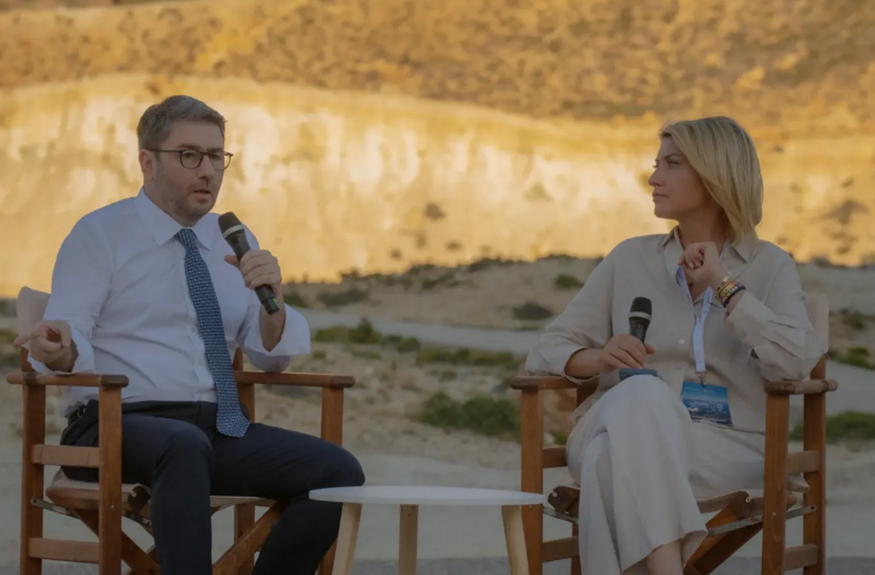
"We must, first of all, as a country stop communication games in diplomacy, such as stopping creating narratives for internal purposes."
On the government's side, Mr. Stavros Papastavrou, Minister of Environment and Energy, referred to the challenges of energy security and Greece's efforts to address them through diplomatic and energy agreements.
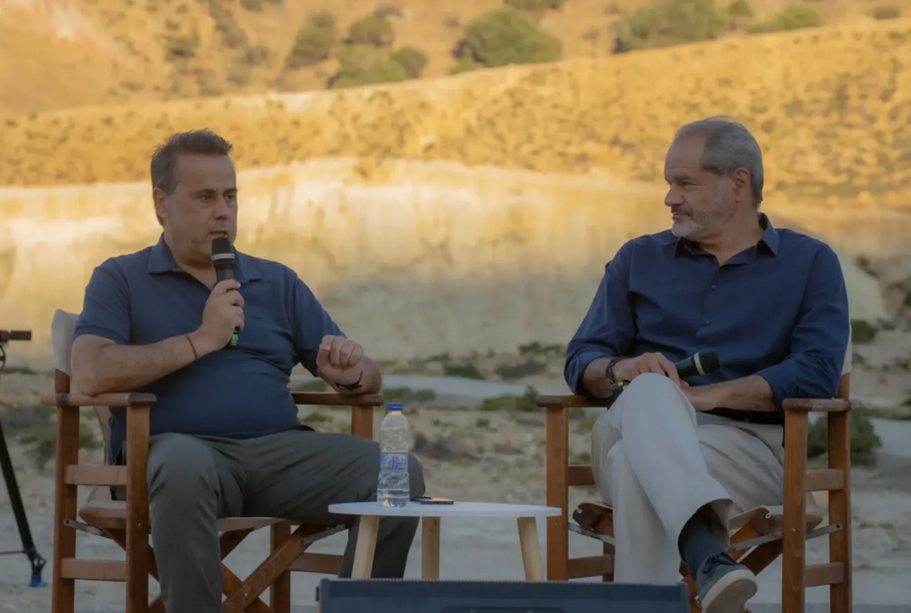
He agreed with the importance of Law 4001/2011 on energy development, describing the course of such initiatives as a "relay race" that requires continuity and cooperation beyond political changes for the good of Greece. He also announced the launch of the European Working Group on the Energy Price Difference, stressing that the systematic price difference creates an "energy curtain" in Europe that separates Central and Eastern and Southern Europe. Finally, regarding relations with Libya, Mr. Papastavrou expressed optimism, mentioning that Libya has announced a tender for plots that "fully respect the middle line".
"The systematic price difference is not only a clear burden on households in our countries and a burden on the competitiveness of companies and industries in our region, but also a profound political sign."
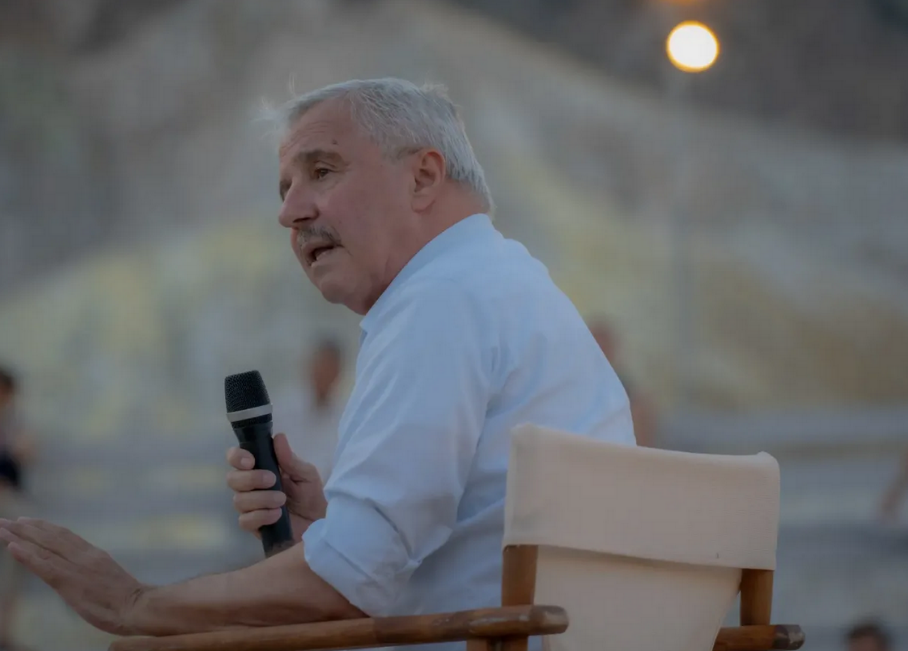
Mr. Yannis Maniatis, MEP and Vice-President of the European Socialists and Democrats, expressed the view that the planning of the energy market in Greece was done in a completely wrong way five to six years ago. He stressed Greece's absence from hydrocarbon exploration for ten years and suggested that the issue of Turkey's breach of the cable connection be raised in the European Council, calling for a decision that will uphold Greece's sovereign rights. He pointed out the importance of Europe playing an active role towards Turkey:
"Turkey and Erdogan seek to discuss at a bilateral level because that is where they have an advantage. We should seek to always escalate issues to Euro-Turkish level. The Baltic countries have successfully done it in the past regarding their interconnector cable, where a European coordinator was appointed to run the project."
A wake up call for the importance of preserving Natural Wealth
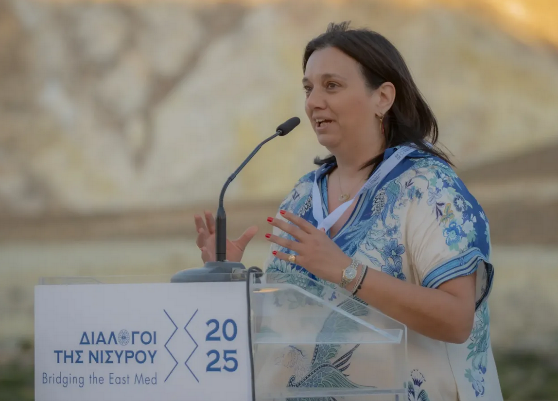
In a timely intervention, the President of the Natural Environment & Climate Change Agency (OFYPEKA), Ms. Maria Papadopoulou, underlined the value and need to safeguard Greece's natural resources and especially those of our island regions.
As she noted, "energy is very critical for this region, but it is not only the energy that this region has. The region has its natural environment which, together with culture, are the two axes that will give the comparative advantage to the country and tourism". Ms. Papadopoulou reiterated the Organization's commitment to support areas that have a natural capital that is unique, to highlight and develop it.
Tourism, Development and the Future of the Islands
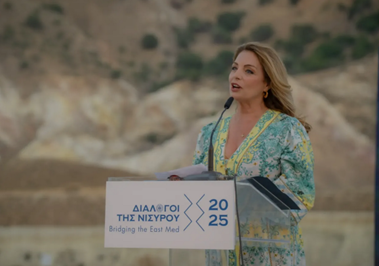
Ms. Angela Gerekou, President of the Hellenic Tourism Organization and former Deputy Minister of Culture and Tourism, referred to tourism not only as an economic indicator, but as "the most peaceful form of foreign policy".
She underlined the importance of "small scales" for the creation of a concentrated dynamic that leads to great results. She pointed out the need for sustainable tourism and the exploitation of local products, stressing that Greece lags behind countries such as Italy (agrotourism in Tuscany), France and Austria.
We safeguard our sea borders

Mr. Stefanos Gkikas, Deputy Minister of Maritime Affairs & Insulary Policy, stressed that Greece is exercising its sovereign rights on the ground, against Turkey's revisionist tactics by strengthening its armed forces and deterrence capabilities. He focused on the ongoing Coast Guard reinforcement program and emphasized the critical role that the Greek Coast Guard has played during the migration crisis, rescuing 260,000 people from the sea within 10 years.
The Regions need a clear role, a strong voice and a uniting narrative
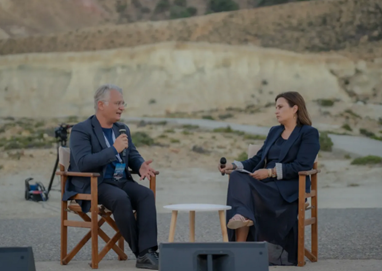
Sustainable development, a strong regional voice, the utilization of comparative advantages and the integrated management of critical resources, such as water, were at the center of the statement of the Regional Governor of the Peloponnese, Mr. Dimitris Ptochos, in the «Dialogue» for the sustainable development of islands and the region.
In a meaningful discussion with journalist Alexia Tasouli, the Regional Governor of the Peloponnese raised the great challenge of the coming years in the public debate: the formation of a new model of regional development, with a clear role for the Regions, the enhancement of local attractiveness and modern, realistic approaches to timeless problems, such as demographics and water resource management.
Cultural Heritage as a Driver of Development: Challenges and Prospects
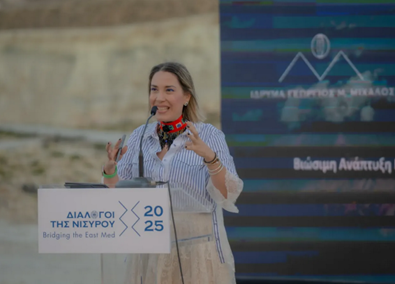
Dr. Fay Makantasi, Research Director of "DiaNEOsis" presented the study "Culture as a lever for Development", highlighting the huge but underutilized potential of the cultural and creative sectors in Greece.
The research revealed significant weaknesses: low productivity (1.4% of Gross Value Added), negative trade balance of cultural products and the lowest government expenditure per capital in Europe on culture. the hyper-centralized character of Attica. The main conclusion is the need for a long-term, holistic, state, cultural strategy, with measures of financing, extroversion and protection of workers.
"Culture is the only asset that the country has and has not been adequately exploited. But culture is a vehicle for environmental, aesthetic, social and economic sustainability."
Financial Tools and the Banking System: Challenges for Sustainable Development
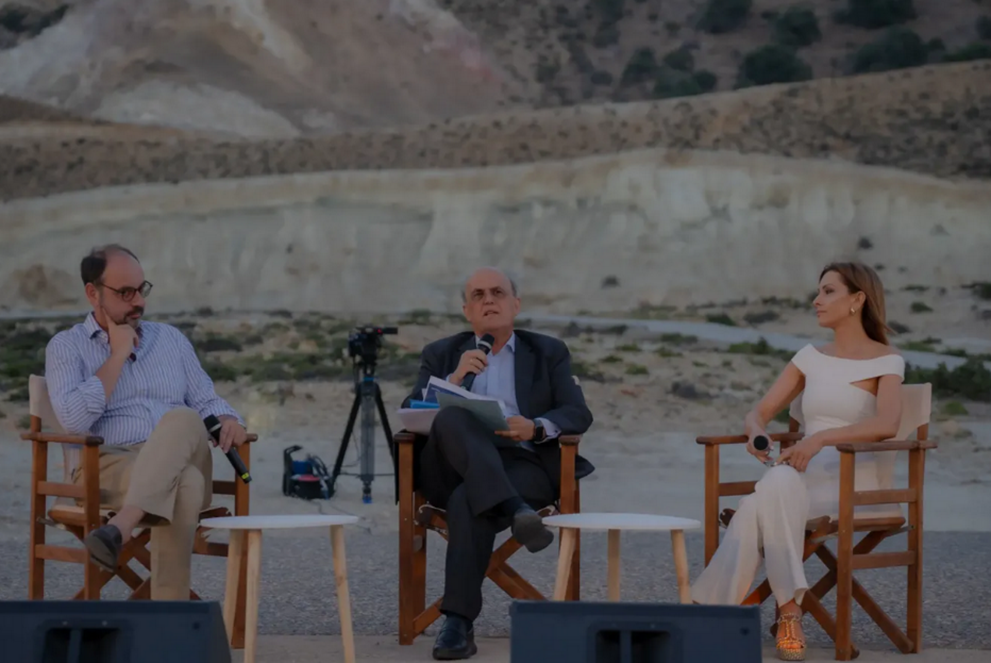
Mr. George Zavvos, President of the Hellenic Development Bank, underlined the entry of the Greek banking system into a new, more profitable and extroverted period, stressing the crucial role of the Development Bank in supporting small and medium-sized entrepreneurship. In this context, he mentioned that the Bank has approved 72,000 loans, totaling more than 13 billion euros, to over 53,000 businesses and 18,000 individuals within five years. with 74% of these being very small businesses. He stressed that the Development Bank "leverages public resources", while loans of 323 million euros have been allocated specifically for the Dodecanese. euro.
On his part, Mr. Ilias Lekkos, Group Chief Economist of Piraeus Bank, explained that banks remain cautious due to the crisis and the strict European supervisory criteria, even though they have the necessary deposit and capital base for financing. He pointed out that Greek companies have not noticed the change in the way the banking system operates, which is now not only based on who is a good entrepreneur or has reliable plans but also on the quality of the company's balance sheet, stressing that "Greek businesses have not realized that the way the banking system operates has changed and that small and medium-sized entrepreneurship should start capturing its real financial data in order to be able to be financed."
Sustainable Development in the Greek Islands: Challenges and Solutions
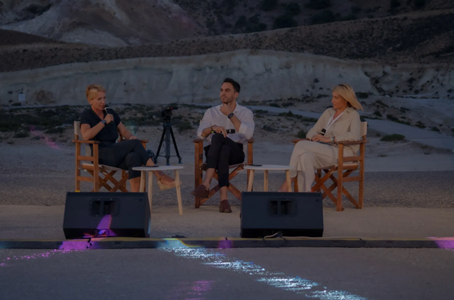
The priorities for sustainable development in the Greek islands were discussed at the «Nisyros Dialogues» by Ms. Alexandra Sdoukou, Press Representative of Nea Demokratia and Mr. Manolis Christodoulakis, Member of Parliament PASOK - KINAL- Head of the Environment Sector of the Parliamentary Group.
Ms.Sdoukou emphasized the diversity of the 120 inhabited islands and the high cost of energy, proposing practical solutions through electrical interconnections and "unlocking" of Renewable energy systems.
She also announced a national strategy for water. Speaking on the issue of water, she announced that "soon a national strategy will be announced shedding more light on the problem on the islands".
Mr. Christodoulakis pointed out the lack of approved spatial planning for tourism, calling for resilience, infrastructure and environmental protection, with emphasis on desalination systems with RES, modernization of water supply networks and wastewater treatment.
"We must see tourism as an opportunity and not as a danger. Infrastructure projects, roads, networks, health infrastructure are needed. We need to change the mix and find the right balance."
Closing with a high-level Dialogue
The epilogue of the day was given with the keynote speech of the Deputy Prime Minister, Mr. Kostis Hatzidakis, who underlined the importance of attracting investments and the need for new sources of financing. It was mentioned that "this government has secured new sources of financing of up to 8.5 billion, three billion, to deal with all these problems", stressing that the islands are at the heart of this policy.
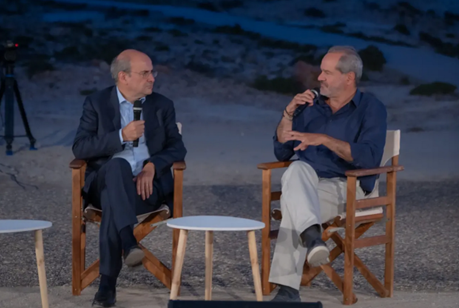
Regarding Greek-Turkish relations, Mr. Hatzidakis supported the policy of "peaceful coexistence with Turkey, based on respect for international law". He rejected self-victimization in the face of unpredictable behaviors of international actors, stressing that "we must not forget the successes of foreign policy."
"This government has secured new sources of funding of up to 8.5 billion, three funds, to address all these problems."
He also did not fail to respond to the statements of the President of PASOK earlier regarding OPECEPE, mentioning the assumption by the government of the responsibility that belongs to it, but emphasizing the fact that the issue was timeless and the previous governments were aware of it.
Day 2 – July 5, 2025
After a dynamic start, the «Nisyros Dialogues»® continued on their second day, delving into critical issues shaping the geopolitical and socioeconomic landscape of the Eastern Mediterranean and beyond. The agenda included discussions on cultural cooperation, digital governance, artificial intelligence and geo-cybersecurity, defense and international relations, energy and the environment, as well as sustainable tourism development.
Intercultural Cooperation and Religious Diplomacy: A Historical Retrospective and Challenges
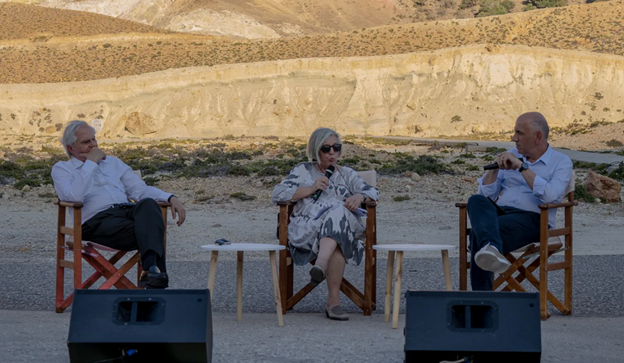
The second day began with an interesting discussion on intercultural cooperation and the role of religion in the Eastern Mediterranean. The discussion, moderated by SKAI journalist Manolis Kostidis, featured Ambassador (ret.) Dimitris Paraskevopoulos and Professor Emerita of Arab Studies at NKUA, Eleni Kondyli, as speakers. Together, they analyzed the historical aspects of the coexistence of peoples in the Eastern Mediterranean.
It was emphasized that contact between cultures forms the basis for the survival of societies, with examples ranging from ancient writing to language and medicine, where the connections and linguistic borrowings between Greeks and Arabs are numerous. The Ambassador highlighted the importance of culture and religion as crucial factors, especially in a region where the three monotheistic religions were born.
Particular emphasis was placed on the negative effects of the "extreme and misuse of religions-cultures" as well as "external interventions," with references to interventions in Iraq, Syria, and Libya, which led to a significant decline in interculturalism and disruption of the region's geopolitics. The question was raised of how Greece can approach these areas through religious diplomacy, given the presence of Christian communities that have survived for centuries in Syria, Egypt, and the Middle East. The activation of international actors and a concerted effort to protect cultural pluralism were proposed, with Saudi Arabia and the Gulf states emerging as important partners in this dialogue.
Digital Governance, Artificial Intelligence, and Geo-Cybersecurity: Greece at the Forefront
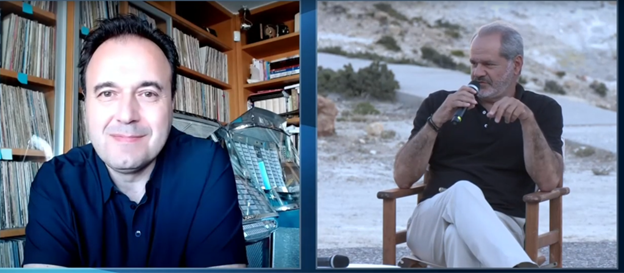
The dialogue then turned to digital governance and Artificial Intelligence (AI) via an online conversation between the Minister of Digital Governance, Mr. Dimitris Papastergiou, and the director of the English edition of Kathimerini, Mr. Athanasios Ellis. In the discussion, which took place a few hours after the ministry's name change, the Minister emphasized the addition of Artificial Intelligence to the Ministry's name, signaling the government's priority in this sector. He pointed out that technology knows no borders and has the ability to decentralize services, offering every citizen, regardless of location, the same easy access to digital information, referring to the e-regions program, which will offer at least 250 digital services to all citizens, particularly benefiting island and remote areas.
Special mention was made of the Ministry's work in the space sector, which will cover the entire country for monitoring and predicting weather phenomena, agriculture, and other sectors. The launch of the first Greek-made microsatellite was also announced, along with an experiment using optical laser technology for communication with a device in space, at a distance of 300 million kilometers.
A significant part of the Dialogue focused on the construction of the "Daedalus" supercomputer, which will be one of the top 10 machines in Europe in terms of processing capability at this moment and will contribute to the development of Greek AI models and applications. The Minister emphasized that these resources will be free for startups and research institutions, strengthening the AI ecosystem in Greece.
Regarding the energy needs for these infrastructures, the significant increase in demand (over 500 MW compared to 40-50 MW today) was highlighted. Greece, with the development of renewable energy sources and its geographical position as the southern tip of Europe, can host critical data infrastructures for Europe and the Arab world.
Finally, the issue of geo-cybersecurity was raised, with the Minister admitting that concerns have intensified with the introduction of Artificial Intelligence. The importance of measures taken by the National Cybersecurity Authority and the need to repatriate sovereignty over cloud services, given that most of them are hosted outside Europe, were emphasized.
International Relations and Defense: Turkey's Multifaceted Plan Using Libya as a Vehicle
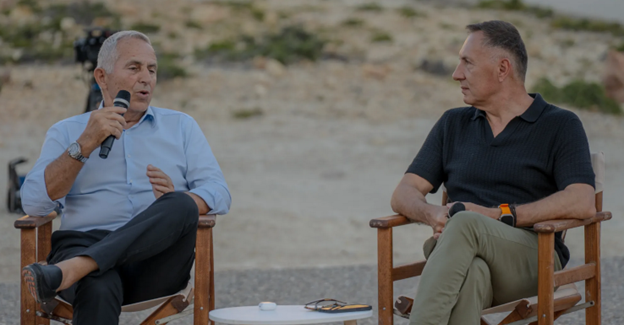
In the next section, Member of Parliament and former Minister of National Defense and Honorary Chief of the Hellenic National Defence General Staff, Admiral Evangelos Apostolakis, discussed relations with Libya and Turkey with ERT journalist Mr. Fanis Papathanasiou. Mr. Apostolakis emphasized the need for cooperation with the Libyan authorities, both on the eastern and western sides, noting that Greek-Libyan relations have deteriorated after the death of Muammar Gaddafi, while Turkey's influence in the region is steadily increasing.
He also expressed particular concern about the Turkish-Libyan memorandum, which he characterized as a "violation of international law" and "lacking any common sense" while highlighting the importance of the concession of four Libyan blocks to the Turkish oil company for hydrocarbon exploration, in which Libya respected the median line of the borders, something which, according to Mr. Apostolakis, was done "so that we would approve the explorations by Turkish vessels and not object to these explorations." For this reason, he emphasized the need for a stable and clear Greek position regarding sovereign rights and the use of all the country's advantages as a bridge between Europe and the Arab world.
Decoding the Geopolitical Chessboard of the Eastern Mediterranean
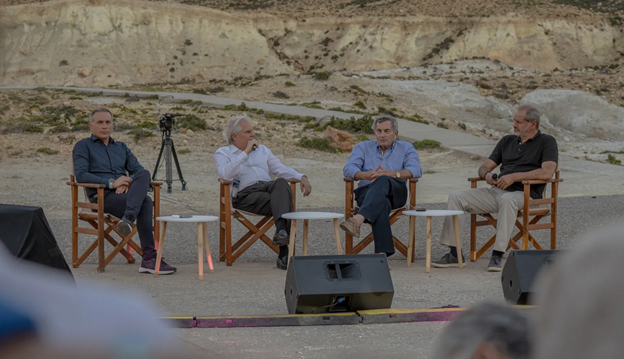
The 4th Dialogue of the day was dedicated to decoding the geopolitical situation in the Eastern Mediterranean with the participation of former US Ambassador to Greece, Mr. Thomas Miller, Ambassador (ret.) Mr. Dimitris Paraskevopoulos, and Professor of International Relations Mr. Konstantinos Filis, moderated by Mr. Athanasios Ellis.
Mr. Miller shared his thoughts on the Trump administration's foreign policy, characterizing it as an "enigma" and "idiosyncratic," referring to the impact of President Trump's personality, which makes the recognition of the strategic direction unpredictable, as he approaches foreign policy in a completely different way from previous administrations.
The discussion focused particularly on the role of Turkey, Iran, and Israel in the region, analyzing the evolving dynamics. Mr. Paraskevopoulos particularly stressed the importance of Iran for the region and that a revision of the borders in the Middle East from those defined in the Treaty of Lausanne is simmering, with a risk of a "domino effect" that would favor Turkey. He insisted that for Greece's benefit, "we must tow Iran into a new nuclear deal."
For his part, Mr. Filis highlighted the importance of the Turkish-Libyan memorandum, which is illegal in every respect but is a reality that "we will have to deal with it for a long time". This is because Turkey makes agreements with states by offering them enhanced considerations compared to what they would get if they made official agreements. "Which Libyan leader will dare to change the agreement with Turkey, which is indeed illegal, to make an agreement with Greece that will offer a smaller economic zone to Libya?"
US Plans and the Greece-US Relationship in the New Trump Era
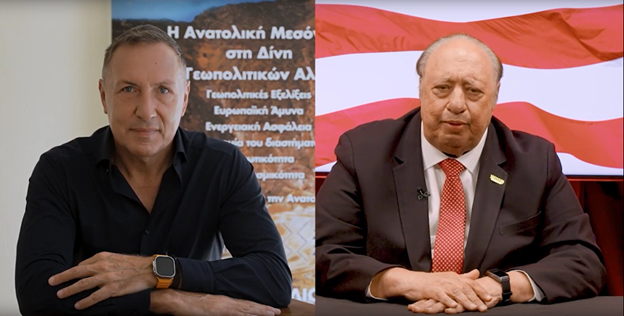
In one of his rare appearances at Greek forums, Greek-American businessman John Catsimatidis provided useful perspectives on the Trump administration's strategy and priorities, in conversation with ERT journalist Fanis Papathanasiou.
His participation in the "Dialogues" via teleconference had a dual symbolic significance, as Mr. Catsimatidis originates fromNisyros and also is proven to be one of the individuals who maintain direct relations with President Trump. Commenting on all issues, Mr. Catsimatidis stated that President Trump's priority is to achieve fair trade agreements with all countries, but without this meaning exploitation of US allies, especially in NATO and Europe.
He emphasized the threat of China on a number of levels, as well as the US commitment to fossil fuels and nuclear energy.
Asked about Greek-Turkish relations, he stressed that "Turkey is a strategic ally of the US in a sensitive region, but President Trump is not going to let anything happen between Greece and Turkey." He added, commenting on the appointment of Kimberly Guilfoyle as US Ambassador to Athens, that "she has direct access to the President, a privilege few countries have."
Energy and Environment: New Resources, Alternative Energy Sources, and the Climate Transition
Following the Dialogues, attention turned to the environment, energy, and new resource sources that can lead the green transition with a 2030 horizon. Moderated by journalist Alexia Tasiouli, speakers in this "Dialogue" were the Secretary of the Academy of Athens, Professor Christos Zerefos, the Rector of NTUA, Professor Ioannis Hatjigeorgiou, NTUA Professor Konstantinos Mathioudakis, and the Head of Energy Trading at DEPA, Mr. Giannis Papamikrouleas.
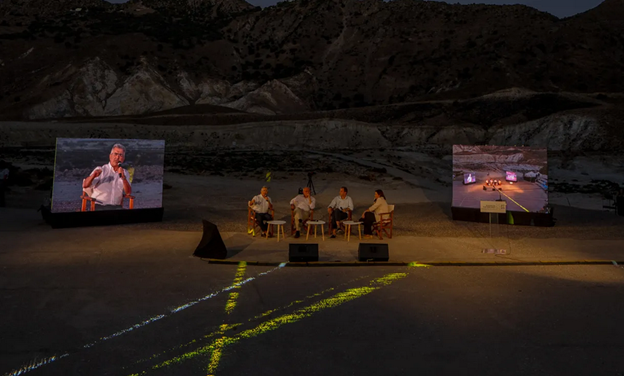
The immense cost of climate change and Europe's battle for autonomy and clean energy

The discussion began with Mr. Zerefos's presentation, who analyzed the current situation regarding global warming, emphasizing that "the temperature increase has exceeded all expectations." According to data, in the Mediterranean over the last 30 years, each year has been warmer than the previous, and especially in July and August, there has been a temperature increase of 3 degrees Celsius, while the Paris Agreement sets an upper target of a 1.5-degree increase for the entire year.
The economic impact of the temperature increase for our country, Mr. Zerefos stated, has been studied in cooperation with the Bank of Greece, and "if we do nothing, the cost of climate change in Greece will be in the hundreds of billions of euros."
At the European level, Mr. Zerefos focused on the effort to achieve energy autonomy by changing the energy mix and strengthening RES. According to study data presented to the President of the European Commission, the transition to RES for 80% of the energy mix by 2030 can be achieved with the further development of wind farms, mobilizing investments of over 100 billion euros in the 2026-2030 five-year period. As Mr. Zerefos revealed, the study was discussed a few days earlier at the 50th G7 Summit in Canada, along with a study on combating forest fires.
Mr. Papamikrouleas of DEPA focused on energy security and the green transition, referring to the mythology of Nisyros and geothermal energy as a source of clean energy. He emphasized DEPA's transformation from a natural gas company to a fully vertically integrated energy company with production from solar plants. He underlined the importance of diversifying sources and international trade for supply security, stressing that "no transition can be sustainable unless it is socially just and realistic."
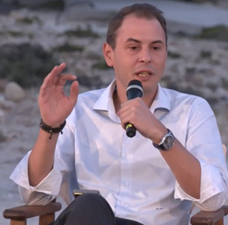
Ο Πρύτανης κ. Χατζηγεωργίου, αναφέρθηκε στις ανεκμετάλλευτες πηγές πλούτου στην Ανατολική Μεσόγειο, όπως το αιολικό δυναμικό και το κυματικό δυναμικό, που είναι υψηλής δυναμικότητας, αλλά τώρα αρχίζουμε να τις καταλαβαίνουμε. Ειδικά για το αιολικό δυναμικό ανέφερε ότι υπάρχουν περιοχές που είναι αντίστοιχες με τα επίπεδα της Νορβηγίας και της Σκωτίας, που όμως υπο-αξιοποιούνται. Όμως όπως τόνισε, «οι πλουτοπαραγωγικές πηγές από το περιβάλλον είναι δεδομένες. Το θέμα είναι να βρούμε το κατάλληλο μίγμα για να τα αξιοποιήσουμε».
Έθεσε το ζήτημα της μη αξιοποίησης των ανανεώσιμων πηγών ενέργειας, με μεγάλο ποσοστό της παραγόμενης ενέργειας να χάνεται λόγω έλλειψης αποθηκευτικών δυνατοτήτων αλλά και την ανάγκη για υπομονή και προσεκτική επεξεργασία των προτάσεων που δίνονται στη δημοσιότητα, αναφέροντας χαρακτηριστικά το παράδειγμα για εγκατάσταση αιολικών σε βραχονησίδες, χωρίς πρώτα να έχει λυθεί το ζήτημα της διασύνδεσής τους.
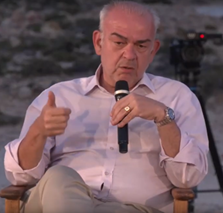
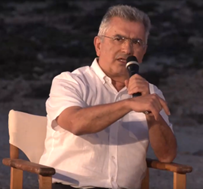
Rector Hatjigeorgiou referred to the untapped sources of wealth in the Eastern Mediterranean, such as wind and wave potential, which are high capacity, but we are only now beginning to understand them. Specifically for wind potential, he mentioned that there are areas comparable to the levels of Norway and Scotland, which are however underutilized. However, as he stressed, "the resource sources from the environment are given. The point is to find the right mix to utilize them."
He raised the issue of the non-utilization of renewable energy sources, with a large percentage of the energy produced being lost due to lack of storage capacity, and the need for patience and careful processing of proposals made public, specifically referring to the example of installing wind farms on rocky islets without first solving the issue of their interconnection.
A significant intervention was made by NTUA Professor Konstantinos Mathioudakis, who stressed the need for resilient and decentralized energy systems, particularly emphasizing the importance of system stability and secure supply. He also typically mentioned that the Greek system still "needs the activation of lignite units to ensure stability while we are throwing away electricity from photovoltaics due to lack of storage infrastructure”.He also highlighted the need for regional cooperation on energy interconnections and early warning systems for climate shocks as ways to manage system variability and pointed out that climate change, with an expected temperature increase and water scarcity, requires "brave leadership" and different approaches to building resilient systems.
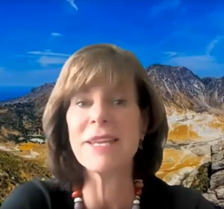
In the same direction, former UK Minister for Energy and Climate Change, Claire Perry O' Neil joined the “Dialogues” with an online interview to give a world view and the current state of play. She stressed the need for resilience against the effects of climate change, and noted that geopolitical events such as tensions between Greece, Cyprus, and Turkey, the situation in Libya, are essentially disputes over resources, mainly energy-related, but also more generally as the Eastern Mediterranean region is warming 20% more than the global average, creating drought conditions in many areas. In this uncertain scenario, as she stated, "being resilient doesn't just mean bouncing back after a problem, it means building systems that don't collapse in the first place."
Athens 2040: Urban Development, Climate Policy, and the Role of Decentralization
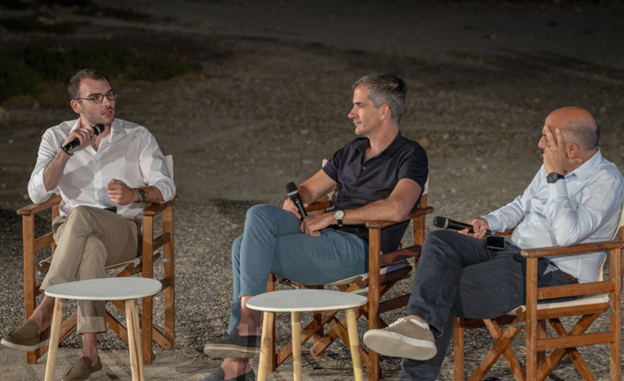
In a discussion with SKAI journalist Manolis Kostidis, the President of the Commission for the Environment, Climate Change, and Energy (ENVE) at the European Committee of the Regions, Kostas Bakoyannis, expressed strong concern about Athens' current urban development system, which threatens to turn it into a "tourist Disneyland" and deprive it of its soul. He emphasized the intense increase in cars and hotel capacity, while proposing sustainable mobility, the freeing up of public space, 70% of which is occupied by parked cars, and the use of mixed uses instead of a “monoculture” of tourism as key axes. "Cities in the twentieth century were designed around cars. In the twenty-first, they must be designed for people," he underlined. However, when asked whether there is overtourism, he responded clearly, stressing that "it is not a matter of overtourism, but a matter of under-planning and under-investing in infrastructure."
Marios Dafnomilis, Foresight consultant at the Special Secretariat for Long-term Planning, referred to the impact of Trump's election on climate policy, highlighting the need for grassroots action when political will is absent at the highest levels. He stressed that governments have a specific term in office, while regions and civil society can maintain continuity in the implementation of environmental policies.
"When dialogue ceases, at the highest levels, regions and communities are called upon to take on the role of problem manager."
Greece and Cyprus on the Great Energy Chessboard of the Eastern Mediterranean
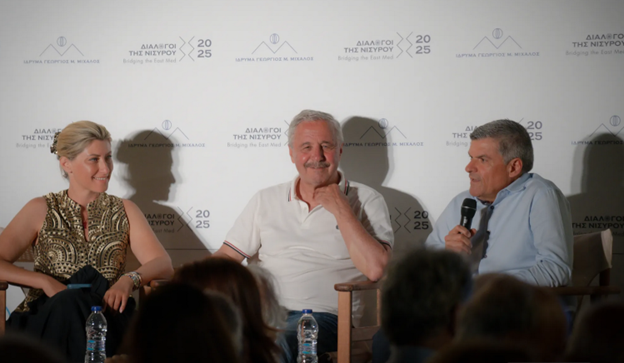
The final "Dialogue" of this year's Nisyros Dialogues took place on the evening of July 5th in Nikeia Square, providing a sensational close worthy of the distinguished speakers who participated in the two days of "Dialogues."
Moderated by SKAI presenter, Ms. Sia Kosioni, MEP and Vice-President of the S&D, Giannis Maniatis, and the Minister of Energy, Industry and Development of Cyprus, George Papanastasiou, discussed the delicate and complex lines along which the Cypriot and Greek authorities are moving to utilize the energy resources available in Cyprus's Exclusive Economic Zone (EEZ).
The discussion was full of announcements, with Mr. Papanastasiou presenting the Cypriot strategy in the field of exploration and announcing for the first time, from the "Dialogues" platform, the successful completion of a new drilling by ExxonMobil in Block 10 of the Cypriot EEZ, an event that significantly increases the potential of the resource.
Mr. Maniatis, giving the European perspective of developments in the region, stressed the need for Greece and Cyprus to develop a common energy doctrine and to seek European support at the European level against Turkey's challenges for the completion of GSI - which is a European project - and for which he stressed "Europe has invested a lot of money."
The two interlocutors agreed on the strategy towards Turkey and that the main approach of Athens and Nicosia should be to upgrade all issues to a European level and avoid bilateral contacts as Turkey claims.
Especially regarding the Turkish-Libyan memorandum, Mr. Maniatis reiterated the difficulties it poses to Greek foreign policy despite the fact that it is completely illegal and irrational. However, he noted that Libya currently appears to “respect the median line of the maritime borders drawn by Greece”, in its recent tender for hydrocarbon exploration on its own part of the border. Something that, as Mr. Maniatis stressed, "constitutes a golden opportunity for Greece" and he proposed "to suggest to Libya that we go to The Hague to settle our own borders," which would indirectly nudge Turkey to accept the legal process of the Court.
Articles
-
Panagiotis Michalos on the 2025 “Dialogues of Nisyros” and the Future of Eastern Mediterranean
-
Nisyros Dialogues - Thomas Miller: Mitsotakis knows how to negotiate with Trump
-
The Eastern Mediterranean in Turmoil – The «Nisyros Dialogues» as the Venue for Strategic Thinking by Yannis Maniatis
Photos
Videos
«Nisyros Dialogues» 2025 - Day #2 Nikia
«Nisyros Dialogues» 2025 - Day #2
«Nisyros Dialogues» 2025 - Day #1


























































































































































































































